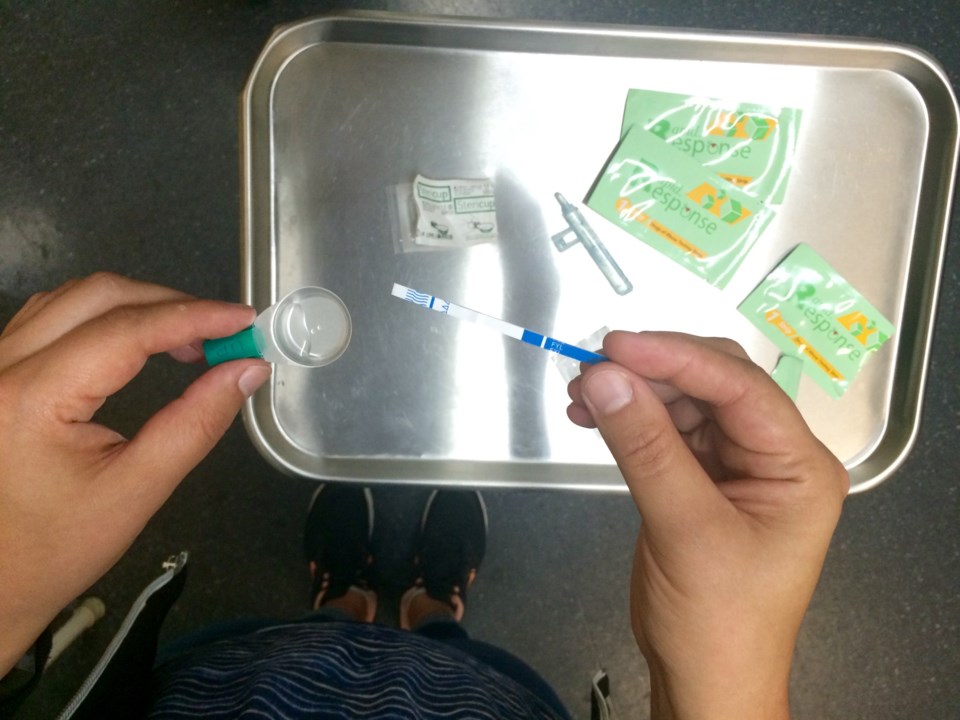The issue of overdose prevention services in Richmond was raised on Friday afternoon after an advocate took to Twitter to warn of a toxic drug seized in Richmond.
Karen Ward, a drug policy consultant for city of Vancouver, tweeted a screenshot of a notification with the caption, “There are no death prevention services in Richmond BC.”
The message in the screenshot read, “Round pink tablet with imprint ‘6’ seized in Richmond found to contain fluclotizolam, a benzo analog more toxic than etizolam. May cause sedation. Don’t use alone.”
The benzo analogue in question is “extremely potent” and “not legally available in Canada,” Ward told The Richmond News. It is unclear whether this was the first time the tablet was discovered in Richmond, as “relatively few findings are actually made public this way.”
This discovery is worrying for several reasons, said Ward, especially because “we don’t know what this pill was being sold as.”
Questions include whether people were trying to buy a prescribed benzodiazepine (like clonazepam or Ativan) and got this substance which “could knock them out for a few days” and whether they went to the street for the drug because they lacked access to a doctor.
Anti-anxiety medications such as clonazepam are useful for helping people manage panic attacks, explained Ward.
“Panic attacks are awful and people who have experienced them would be desperate to avoid a further episode. Being denied this medication would cause… more anxiety.”
She added that the current state of the healthcare system and psychological stress due to the ongoing COVID-19 pandemic are also causing concern.
Richmond lacks publicly accessible overdose prevention services
According to BC Coroners Service data, 22 people in Richmond died because of toxic drugs between January and July. Across the province, there was a 31 per cent increase overall in the number of deaths recorded in July compared to June, with at least 192 lives lost due to toxic drugs.
Data also shows no deaths were reported at supervised consumption or drug overdose prevention sites.
However, the only overdose prevention services in Richmond are provided in temporary supportive housing such as the new Aster Place, which is only available for residents.
“People have no option to use (a safe consumption site),” said Ward. “This also sends the message that only homeless people use drugs and are at risk.”
Findings in the BC Coroners Service death review panel report from March 2022 show that 13 per cent of people who died were occasional users of illicit drugs, and 35 per cent were employed. Between August 2017 and July 2021, 65 per cent of people who died from toxic drugs lived in private or non-subsidized residences.
Mark Lee, who is running for city council with the Richmond Citizens’ Association, thinks Richmond can do better to address the issue.
“We are seeing more preventable deaths by poisoned drugs year over year in Richmond, six years into a declared public health emergency, and we are missing key resources that we know prevent people from dying,” he said.
Lee thinks the “lack of knowledge” and “lack of political will” are reasons why Richmond doesn’t have publicly available overdose prevention sites.
“These decisions are made by people who do not understand harm reduction. I often hear that politicians think ‘the Chinese community’ would be opposed, which, even if it were true, is not a reason to forego life-saving measures,” he said.
The News asked Mayor Malcolm Brodie for comment about overdose prevention sites while at an unrelated event. He said he wasn’t prepared to discuss the issue at that time but added overdose prevention services is a health question that should be directed to Vancouver Coastal Health (VCH).
Lee, however, thinks the city has a role to play as it determines land use and grants permits for facilities wishing to provide such services, and it enters into lease agreements with operators.
He suggested the city can work “collaboratively” with VCH by granting “use permits for the provision of healthcare services through existing spaces that already serve drug users.”
Referencing Ward’s past comment regarding the simple logistics for providing such services out of underutilized spaces, Lee added that the city needs decision-makers who can help harm reduction workers “or get out of the way.”
“Saying that it's VCH's jurisdiction when the process of getting overdose prevention sites up and running is a collaboration between the city and the health authority is just another way of passing the buck,” said Lee.
“The city can and should be an advocate for services and not a barrier.”



